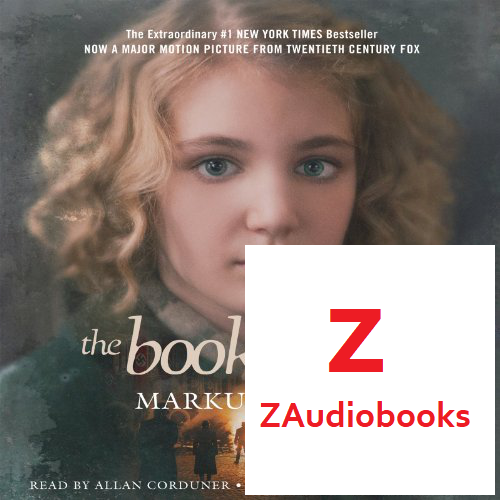This is The Book Thief audiobook (rate button is after the title, please rate and leave a comment to share your thoughts. If the the description is missing, we will update soon or you can share anything you know about this audios it in comments section. Thank @Steven for sharing this audios). Lets play The Book Thief full audios free online in the audio player below.

Overview of “The Book Thief”:
1. Author and Background:
Markus Zusak, an Australian author of German and Austrian descent, wrote “The Book Thief” as his fourth novel. Born in 1975, Zusak has gained international recognition for his powerful storytelling and ability to tackle complex themes.
2. Setting and Premise:
The novel is set in Nazi Germany and follows the life of Liesel Meminger, a young girl living with a foster family. Liesel steals books and shares them with others, finding solace and connection through the written word. The story explores themes of love, loss, courage, and the impact of war on ordinary lives.
3. Narrative Style:
Death serves as the narrator, providing a unique and often poignant perspective on the events of Liesel’s life. The narrative style, coupled with Zusak’s lyrical prose, contributes to the novel’s emotional resonance and distinctive voice.
Audiobook Adaptation:
1. Narration:
The choice of a narrator is crucial for an audiobook adaptation, particularly for a novel with Death as the narrator. The voice must convey the appropriate tone, balancing the gravitas of the wartime setting with the emotional nuances of the characters. A skilled narrator can bring the story to life, capturing the essence of Zusak’s writing.
2. Pacing and Tone:
Given the emotional depth of the novel, the pacing and tone of the audiobook are crucial. The narrator should navigate the various moods of the story, from moments of humor and warmth to instances of heart-wrenching sadness. Effective pacing enhances the listener’s connection to the characters and the unfolding narrative.
3. Character Voices:
“The Book Thief” features a diverse cast of characters, each with their own distinct voice and personality. A talented narrator can differentiate character voices, adding depth to the audiobook experience and allowing listeners to connect with the characters on a more personal level.
4. Handling Multilingual Elements:
The novel includes instances of German phrases and dialogue. An audiobook adaptation may need to consider how to handle these multilingual elements, ensuring that listeners can follow the narrative seamlessly. Clear pronunciation and context can enhance the understanding of these linguistic nuances.
Themes in “The Book Thief”:
1. The Power of Words:
Central to the novel is the theme of the power of words. Liesel’s love for books and her ability to read and share them with others becomes a form of resistance and a source of comfort in a time of upheaval. The audiobook should emphasize the significance of words in shaping the characters’ lives.
2. Humanity Amidst War:
“The Book Thief” explores the resilience of the human spirit in the face of war’s brutality. Amidst the darkness, the novel highlights acts of kindness, love, and courage that illuminate the characters’ humanity. The audiobook should convey the emotional impact of these moments.
3. Loss and Grief:
The characters in the novel experience profound loss and grief. Liesel, her foster parents, and others in the town grapple with the devastating effects of war. The audiobook should sensitively convey the emotional weight of these themes, allowing listeners to connect with the characters’ struggles.
Critical Reception and Impact:
1. Critical Acclaim:
“The Book Thief” has received widespread critical acclaim for its narrative depth, unique perspective, and exploration of universal themes. The novel has been praised for its ability to resonate with readers of various ages and backgrounds.
2. Awards and Recognition:
The novel has won numerous awards, including the Michael L. Printz Honor and the Commonwealth Writers’ Prize. Its inclusion on bestseller lists and its enduring popularity contribute to its recognition as a contemporary classic.
3. Adaptations:
In addition to its literary success, “The Book Thief” was adapted into a film in 2013. While the audiobook format predates the film adaptation, the story’s ability to transition across different mediums underscores its broad appeal.
Trends in Literary Audiobooks:
1. Emphasis on Emotional Narration:
Literary audiobooks often prioritize emotionally resonant narration. A skilled narrator can convey the depth of the characters’ emotions, enhancing the overall impact of the story.
2. Inclusion of Author’s Note:
Some audiobooks include the author’s note or afterword as part of the recording. In the case of “The Book Thief,” Markus Zusak’s reflections on the inspiration behind the novel and its significance could provide valuable insights for listeners.
3. Collaboration with Authors:
Collaborative efforts between narrators and authors in the audiobook industry are becoming more common. Authors may participate in the audiobook production, offering guidance on the intended tone and character portrayals.
Conclusion:
An audiobook adaptation of “The Book Thief” has the potential to be a powerful and emotionally resonant experience for listeners. Through careful narration, attention to pacing, and an understanding of the novel’s thematic depth, the audiobook can capture the essence of Markus Zusak’s storytelling. As a narrative that celebrates the enduring power of words and explores the humanity that persists even in the darkest times, “The Book Thief” invites audiences to reflect on the profound impact of literature and the connections that transcend the boundaries of time and circumstance.


